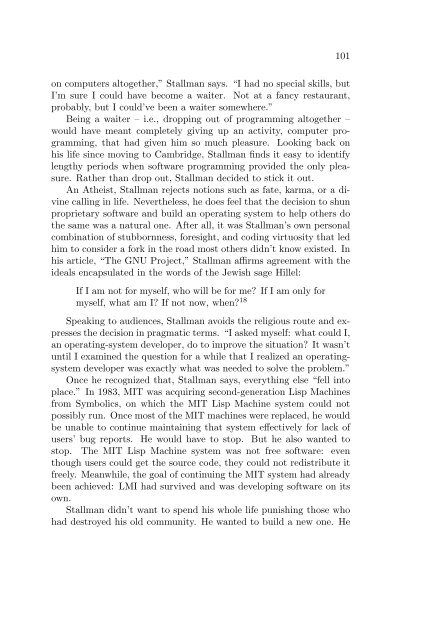Create successful ePaper yourself
Turn your PDF publications into a flip-book with our unique Google optimized e-Paper software.
101<br />
on computers altogether,” Stallman says. “I had no special skills, but<br />
I’m sure I could have become a waiter. Not at a fancy restaurant,<br />
probably, but I could’ve been a waiter somewhere.”<br />
Being a waiter – i.e., dropping out of programming altogether –<br />
would have meant completely giving up an activity, computer programming,<br />
that had given him so much pleasure. Looking back on<br />
his life since moving to Cambridge, Stallman finds it easy to identify<br />
lengthy periods when software programming provided the only pleasure.<br />
Rather than drop out, Stallman decided to stick it out.<br />
An Atheist, Stallman rejects notions such as fate, karma, or a divine<br />
calling in life. Nevertheless, he does feel that the decision to shun<br />
proprietary software and build an operating system to help others do<br />
the same was a natural one. After all, it was Stallman’s own personal<br />
combination of stubbornness, foresight, and coding virtuosity that led<br />
him to consider a fork in the road most others didn’t know existed. In<br />
his article, “The GNU Project,” Stallman affirms agreement with the<br />
ideals encapsulated in the words of the Jewish sage Hillel:<br />
If I am not for myself, who will be for me? If I am only for<br />
myself, what am I? If not now, when? 18<br />
Speaking to audiences, Stallman avoids the religious route and expresses<br />
the decision in pragmatic terms. “I asked myself: what could I,<br />
an operating-system developer, do to improve the situation? It wasn’t<br />
until I examined the question for a while that I realized an operatingsystem<br />
developer was exactly what was needed to solve the problem.”<br />
Once he recognized that, Stallman says, everything else “fell into<br />
place.” In 1983, MIT was acquiring second-generation Lisp Machines<br />
from Symbolics, on which the MIT Lisp Machine system could not<br />
possibly run. Once most of the MIT machines were replaced, he would<br />
be unable to continue maintaining that system effectively for lack of<br />
users’ bug reports. He would have to stop. But he also wanted to<br />
stop. The MIT Lisp Machine system was not free software: even<br />
though users could get the source code, they could not redistribute it<br />
freely. Meanwhile, the goal of continuing the MIT system had already<br />
been achieved: LMI had survived and was developing software on its<br />
own.<br />
Stallman didn’t want to spend his whole life punishing those who<br />
had destroyed his old community. He wanted to build a new one. He


